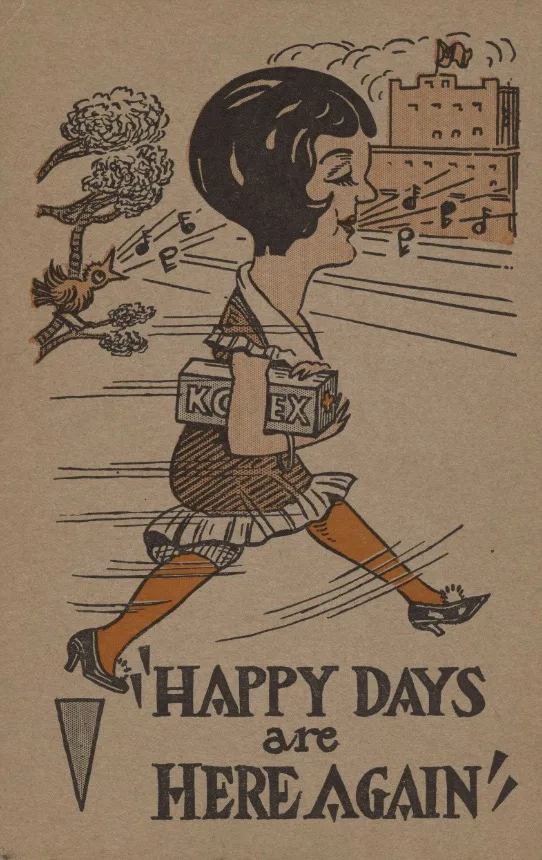Menstrual products free of charge in every public school with students in grades six through twelve.
A special hand motion might be a distress signal
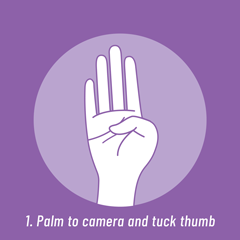
This is a hand signal victims of sexual and domestic violence may use to signal that they are in trouble Bystanders that witness this gesture are encouraged NOT to approach the situation but to call law enforcement right away.
For more information visit https://www.verywellhealth.com/tiktok-distress-hand-signal-5210298
California women being charged with murder for stillborn births
California women being charged with murder for stillborn births
The movie Harriet hits theaters November 1
Harriet, the story of Harriet Tubman, in theatres Nov 1. Can't want to be inspired! #p2
AOC stars in a movie about her 2018 election win

Netflix announces: “529 women ran for congress in 2018 — meet four of them in @knockdownmovie.” And Alexandria Ocasio-Cortez shares on Twitter: “Before my primary, three women & I agreed to film our journey of trying to run for office without big money. Now, #KnockDownTheHouse hits Netflix & select theaters next week, May 1st.”
Visit knockdownthehouse.com to find a screening or learn how to host one. Discussion materials available.
The Masuo women in China are their community’s leaders
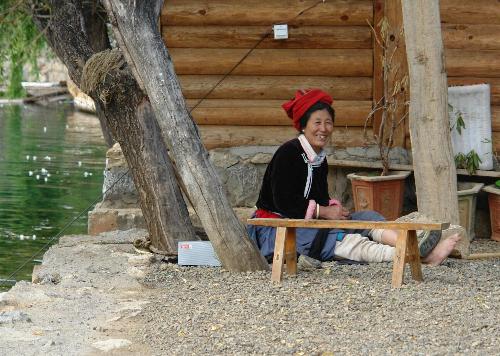
In China’s Himalayan region is a tribe run by women, where all of the major rules and transactions are handled by women. Children are cared for communally and may not know their true fathers. They are raised in homes with grandmothers, aunts, uncles and cousins.
Jump to The Guardian’s article The kingdom of women: the society where a man is never the boss.
Hat tip to Leen De-Weerd Mosley for the fun share.
Update from a Standing Rock volunteer after #45 orders attack on the camp

“Injustice Anywhere is a threat to Justice everywhere.” ~ Dr. King
This is an update from a Standing Rock volunteer. It’s not pleasant.
Friends,
I have returned from Standing Rock with my mind blown, my heart broken and my spirit troubled with foreboding of a deepening tragedy. Volunteering as a legal observer with the Water Protector Legal Collective I witnessed several confrontations between Water Protectors (WP) and law enforcement: national guard, sheriffs and private security (LE).
On 1/18/17 – 1/19/17 I observed WP with their hands in the air chanting “hands up don’t shoot” being fired upon at a range of 10 to 15 feet. Tear gas canisters and rubber bullets ( rubber bullets are regular bullets covered in rubber) were used against unarmed WP who had been singing and praying. I observed national guard chasing WP off the Backwater bridge, firing at people running away. I heard people choking and gagging from tear gas. I saw access to the WP medic vehicles being blocked. I spoke with medics and WP who described bullets penetrating flesh and causing terrible injuries, including to one media person who nearly lost his finger when his camera was targeted.
I talked with a media person and was told of 4 media people on the bridge that night, 3 had their recording devices shot and the 4th, his hand. I saw a photo of a sheriff aiming a rifle directly at a media woman who was standing apart from the crowd. I heard testimony of the back of the medic pickup truck being awash in blood after evacuating wounded.
I watched, and then, inadvertently became a part of, WP being forced off the bridge by national guard who were hiding behind WP vehicles parked along the road and firing rubber bullets at fleeing people. Many people were shot in the back, the neck, the head. When LE fired at people at close range, many were shot in the genitals or in the face. I received information about DAPL security breaching the short wave radio channels of the WP with taunts such as ”come out and fight like men you faggots or we will come to Camp and fuck your women.”
There are some young warriors, who, without the support of their elders, many who want the camps cleared to mitigate the economic and social damage being suffered by the local community in having the bridge closed, have vowed to not leave the camps or to let the last section of pipeline be built.
Driving away from the area on Monday I saw a convoy of construction vehicles heading to the drill pad. Last night an indigenous website live streamed reports of drilling and construction noises coming from the drill pad.
Without the eyes of a free press these attacks and trespasses continue, with the human rights and sovereignty of indigenous peoples denied. The UN Committee on Transnational Corporations and Human Right Abuses was in Standing Rock this week to take testimony of the many transgressions against people: crop dusters spraying poison pesticides and fertilizers on the camps; hair samples indicating the presence of these chemicals; people who have been injured, beat up, arrested, strip searched; media and medics being targeted by snipers; (one medic told me he stopped wearing his Red Cross vest due to medics being targeted); praying people being attacked and the refusal of DAPL and our government to abide by the Rule of Law.
We need to stand up for our brothers and our sisters, for their way of life and, I believe, for our social contract as a democracy which is now threatened.
Please share this so word gets out what is happening, thank you.
Deborah MacKay
Hat tips to Keith D. Wright and Rachelle Brown for the share
We are still not equal. That’s why Women March.

Sleep.Eat.Write responds on Medium to a women who doesn’t believe in women’s rights or the Women’s March entitled, “You Are Not Equal. I’m Sorry.” Here’s an excerpt:
You are not equal. Even if you feel like you are. You still make less than a man for doing the same work. You make less as a CEO, as an athlete, as an actress, as a doctor. You make less in government, in the tech industry, in healthcare.
You still don’t have full rights over your own body. Men are still debating over your uterus. Over your prenatal care. Over your choices.
You still have to pay taxes for your basic sanitary needs…
You are not equal. Your daughters are not equal. You are still systemically oppressed.
Estonia allows parents to take up to three years of leave, fully paid for the first 435 days. United States has no policy requiring maternity leave.
Singapore’s women feel safe walking alone at night. American women do not.
New Zealand’s women have the smallest gender gap in wages, at 5.6%. United States’ pay gap is 20%.
Iceland has the highest number of women CEOs, at 44%. United States is at 4.0%.
The United States ranks at 45 for women’s equality. Behind Rwanda, Cuba, Philippines, Jamaica.
Trump Day 1: hate-based attacks, pussy-grabbing, threats – documented on reporter Shaun King’s Twitter feed

NY Daily News reporter Shaun King is doing something very courageous and important: documenting attacks and reports of hate incidents made by Trump supporters.
We all need to read @ShaunKing's Twitter feed starting yesterday. Prepare yourself first. He's documenting "#Trump Day 1" hate. Horrifying.
— Brent Toderian (@BrentToderian) November 10, 2016
"Almost all white people except for educated white women chose Donald Trump in droves &that's a problem"- @ShaunKing pic.twitter.com/1GajQn8WLV
— HOT 97 (@HOT97) November 10, 2016
This was in Queens, NY. She was asked to go to the back of the bus.
Day 1 of Donald Trump. pic.twitter.com/c4TBmYCoCe
— Shaun King (@ShaunKing) November 10, 2016
This is in Philadelphia.
Sieg Heil, Trump, and swastikas on windows of a local store. pic.twitter.com/Bq1nFW1ipk
An important essay by an honored student on the hypocrisies of inclusion in higher ed

Sung Yim wrote an essay to Columbia University after essays the Korean poet was asked to submit as a student representative of Columbia College Chicago’s Nonfiction writing department were twice rejected and the last essay, cut down to almost nothing to eliminate any controversial bits. The author writes about the author’s own work:
It’s important to keep in mind that my work has always been scathingly political. That is, I would think, part of why the writing faculty nominated my work. It’s also important to keep in mind that they were soliciting short work of a long-form artist. I was clipping and revising each piece I was submitting to them, which took hours of free labor.
The practice of gender checking women Olympians is being challenged, as sex is a complex matter
 Imagine being born a women into a traditionalist culture which assigns many sex-specific duties and obligations that determine what you can do and how you must act, becoming an athlete who broke sports and social boundaries with her stellar performances and then being banned from competing after reaching majority age because your body was deemed to possess too many male characteristics or hormones. This happened to India’s Dutee Chand when she turned 18 – but only after she was unwillingly subjected to a series of intrusive and humiliating physical checks.
Imagine being born a women into a traditionalist culture which assigns many sex-specific duties and obligations that determine what you can do and how you must act, becoming an athlete who broke sports and social boundaries with her stellar performances and then being banned from competing after reaching majority age because your body was deemed to possess too many male characteristics or hormones. This happened to India’s Dutee Chand when she turned 18 – but only after she was unwillingly subjected to a series of intrusive and humiliating physical checks.

This has happened to other athletes as well, but only when they compete as women athletes. Like other woman athletes, Chand has not enjoyed robust support from her government (the Times coverage on this story includes an enchanting profile on Chand, but South Africa rallied around Caster Semenya when her womanity was called into question (NYT):
Unlike India, South Africa filed a human rights complaint with the United Nations arguing that the I.A.A.F.’s testing of Semenya was “both sexist and racist.” Semenya herself would later write in a statement, “I have been subjected to unwarranted and invasive scrutiny of the most intimate and private details of my being.”
… Not long after the policy went into effect, sports officials referred four female athletes from “rural or mountainous regions of developing countries” to a French hospital to reduce their high testosterone, according to a 2013 article in The Journal of Clinical Endocrinology & Metabolism. The authors, many of whom were physicians who treated the women, describe telling them that leaving in their internal testes “carries no health risk,” but that removing them would allow the athletes to resume competition, though possibly hurt their performance. The women, who were between 18 and 21, agreed to the procedure. The physicians treating them also recommended surgically reducing their large clitorises to make them look more typical. The article doesn’t mention whether they told their patients that altering their clitorises might impair sexual sensation, but it does say the women agreed to that surgery too.
Dunkin Donuts staffer’s racism wins a Chinese mom international support
Ms. Shih feared for the safety of her little family group and afterwards, wrote to Dunkin Donuts about the incident. I can’t find her post on the Dunkin Donuts Facebook page, so I guess it’s been removed but you can see that there is no suppressing this story. It’s well on its way to going viral with over 19K responses, 12341 shares and 3.9K comments already. Plus, the story has been picked up by the social stratosphere and news outlets in Taiwan, Hong Kong and the Asian-American press. Here’s an interview incorporating bits of Ms. Shih’s video.
My guess is that the South Asian employee resented this woman for enjoying an economic status sufficient to have a nanny, and so made it his personal mission to humiliate her that day for the transgression of being an Asian wealthier than himself. Some commenters say the fellow’s been fired, and I hope this is true. No customer should ever be treated like Ms. Shih was and the fact that it happened to a mom with a baby in tow makes the incident even worse.
Even if the store is owned by an independent franchise operator, a corporation can still sanction a licensee for violating the customer service standards of the franchise agreement. In fact, the corporation could possibly go so far as to revoke the franchise license. What ever actions Dunkin Donuts undertakes, it should certainly take meaningful steps to ensure that this never happens to another customer, ever again.
And by the way, cockroaches have been abundantly reported spotted at this location. Ewe! What’s up with that?
Here’s Ms. Shih’s story:
Hi, I went to this Dunkin Donuts located at 100-05 Queens Blvd, Forest Hills, NY 11375 with my nanny & my one year old son today 5/30/2016 at 3:38pm. Besides juice & hot chocolate, we order Glazed chocolate donut. Staff Yaibur R. told me that I have to say the whole name of the donut. I point it to him & tell him that I want the “glazed chocolate donut” with a accent. He is like “What? What are you saying?” I point it again & say “that chocolate donut.” He does not even want to look & help me. He just look at me & say “you have to say the whole name of the donut.” I say why should I say the whole name. You already know what I want. You just want to make fun of me. He said you just have to say it in order to order it. I said I want to talk to your manager. He said you don’t have to see the manager. Manager is not here. You think he will be here all the time. He has home. Today is holiday. He has to go home. I say what is your name? He point his name tag & say “Here is my name. Do you know how to say it?” I insist to see the manager. Of course that staff ignore me. And then, this customer start to scream at me. When I start to use my phone to record, that Dunkin staff finally stop making fun of me. But this customer start to approach me & scream at me saying that he is going to take my phone away & throw it outside of window. I say don’t touch me. I am calling the police. The customer even say that I must be illegal. How humiliated. The staff is just standing there laughing. Doing nothing. I called the police. This guy keep making fun of me before he run away. He even call the police & tell them that i am just a Chinese lady who doesn’t like the Dunkin personnal’s attitude. Language violence? Discrimination? Bully the women with a children? Is this represent Dunkin Donus? This behavior of discrimination & arrogant is unacceptable.
NPL hosts event for launch of book on outstanding women in Puerto Rican history on June 29

The New Jersey Hispanic Research and Information Center @ The Newark Public Library and the Friends of HRIC are co-hosting the launch of the new book, Nationalists Heroines: Puerto Rican Women History Forgot 1930s-1950s, by Dr. Olga Jiménez de Wagenheim, Professor Emerita in History, Rutgers University. The public is welcome at this event.
A book signing and reception will follow the talk and reading.
Book Release Event for Nationalists Heroines:
Puerto Rican Women History Forgot, 1930s-1950s
Wednesday 29 June | 6 PM
@ The Newark Public Library
Centennial Hall
5 Washington Street, Newark, NJ
973-733-3637 or 973-733-7772
Historians have largely overlooked the roles of the Puerto Rican women who were active members of the island’s Nationalist Party and fought to end what they considered to be the U.S. government’s illegal occupation of Puerto Rico. Dr. Wagenheim’s latest book seeks to rescue the stories of these courageous women who gave up their freedom in search of their homeland’s independence. Attached is a brief note from the publisher’s site.
Olga Jiménez de Wagenheim is author of Puerto Rico: An Interpretive History, El Grito de Lares: sus causas y sus hombres, Puerto Rico’s Revolt for Independence: El Grito de Lares and co-editor with Kal Wagenheim of The Puerto Ricans: A Documentary History.
For more information contact:
Ingrid Betancourt, Director
NJ Hispanic Research and Information Center
@ The Newark Public Library
ibetancourt@npl.org
5 Washington Street
Newark, NJ 07102
973-733-3637 or 973-733-7772
Publisher’s statement about Nationalist Heroines: Puerto Rican Women History Forgot, 1930s-1950s by Olga Jiménez de Wagenheim
From the moment the United States seized Puerto Rico, in 1898, to the 1950s, the islanders employed various forms of resistance to the imposition of American colonial rule. A group of Nationalists led by Pedro Albizu Campos made it clear that they would free Puerto Rico, by armed struggle if necessary. A confrontation between the Nationalists and the colonial police in October 1935 left four Nationalists dead. A few months later two Nationalists killed the Chief of Police, Francis E. Riggs. Albizu Campos and seven of his aides were convicted on seditious charges and sent to a federal prison in Atlanta, Georgia. His followers attempted to hold a demonstration in Ponce, Albizu Campos’s hometown, and were gunned down by the police: nineteen unarmed men, women, and children were killed and more than one hundred and fifty wounded. Dominga de la Cruz ran from a place of safety to rescue the flag from a wounded comrade.
Back in Puerto Rico in 1947, Albizu Campos began to plan for a revolution, which he launched on October 30, 1950. A commando unit of five attacked the Governor’s residence while others assaulted police stations in half a dozen cities and towns throughout the island. One woman, Doris Torresola, was shot while protecting her leader. The same day Blanca Canales was one of three to lead the revolt in Jayuya. Two days later, two Nationalists, residents of New York, attempted to kill President Truman at Blair House, his temporary residence. Massive arrests followed and forty-one women were detained on suspicion that they had conspired with the rebels. Two of the fifteen women indicted were sentenced to life in prison. Then, on March 1, 1954, another woman, Dolores Lebrón, led three male companions in an attack on the U.S. House of Representatives in which five congressmen were shot for keeping Puerto Rico in bondage.
Historians have largely overlooked the roles of these Nationalist women. Nationalist Heroines: Puerto Rican Women History Forgot, 1930s-1950s seeks to rescue the stories of the women who gave up their freedom in the quest to free their homeland.
Dr. Olga Jiménez Wagenheim is Professor Emerita in History, Rutgers University, Newark Campus, where she taught 27 years and where she received the Outstanding Teacher of the Year Award (1991), the Humanitarian Award (1998) and many others.
Dr. Jiménez Wagenheim has published several books and numerous articles on Puerto Rico and Puerto Ricans. Among her books are: Puerto Rico: An Interpretive History From Pre-Columbian Times to 1900 (Markus Wiener Pub., 1998), Puerto Rico’s Revolt for Independence: El Grito de Lares (Westview Press, 1984), El Grito de Lares: sus causas y sus hombres (Huracan, 1984), and co-edited with Kal Wagenheim, The Puerto Ricans: A Documentary History (Praeger, 1973, Markus Wiener, 2013).
Indian man invents inexpensive menstrual pad machine & changed rural women’s lives
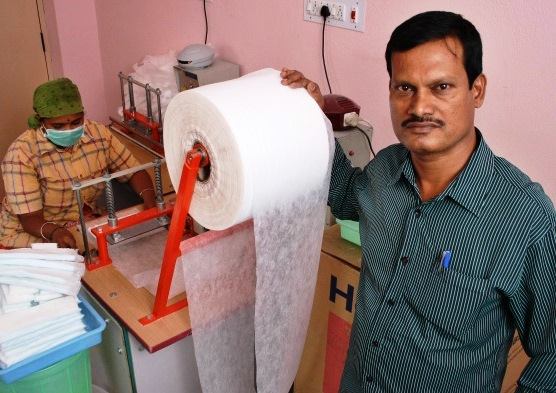
A Mighty Girl reports on Facebook:
After spending years developing a simple machine to make inexpensive sanitary pads, Arunachalam Muruganantham has become the unlikely leader of a menstrual health revolution in rural India. Over eighteen years, Muruganantham’s machine has spread to more than 400 production sites that serve 1,300 villages in the poorest and least developed sections of India. Moreover, since most of his clients are NGOs and women’s self-help groups who produce and sell the pads directly in a “by the women, for the women, and to the women” model, the average machine also provides employment for ten women. His success, both at providing women with more hygienic options and creating local economic opportunities for women, is generating interest in his machine in many developing countries.
For his contributions to menstrual health, Muruganantham was recognized by Time Magazine as one of the world’s 100 Most Influential People in 2014. However, his interest in the topic first began in 1998 when, as a young, newly married man, he saw his wife, Shanthi, hiding the rags she used as menstrual cloths. Like most men in his village, he had no idea about the reality of menstruation and was horrified that cloths that “I would not even use… to clean my scooter” were his wife’s solution to menstrual sanitation. When he asked why she didn’t buy sanitary pads, she told him that the expense would prevent her from buying staples like milk for the family.
Muruganantham, who left school at age 14 to start working, decided to try making his own sanitary pads for less but the testing of his first prototype ran into a snag almost immediately: Muruganantham had no idea that periods were monthly. “I can’t wait a month for each feedback, it’ll take two decades!” he said, and sought volunteers among the women in his community. He discovered that less than 10% of the women in his area used sanitary pads, instead using rags, sawdust, leaves, or ash. Even if they did use cloths, they were too embarrassed to dry them in the sun, meaning that they never got disinfected — contributing to the approximately 70% of all reproductive diseases in India that are caused by poor menstrual hygiene.
Finding volunteers was nearly impossible: women were embarrassed, or afraid of myths about sanitary pads that say that women who use them will go blind or never marry. Muruganantham came up with an ingenious solution: “I became the man who wore a sanitary pad,” he says. He made an artificial uterus, filled it with goat’s blood, and wore it throughout the day. But his determination had severe consequences: his village concluded he was a pervert with a sexual disease, his mother left his household in shame and his wife left him. As he remarks in the documentary “Menstrual Man” about his experience, “So you see God’s sense of humour. I’d started the research for my wife and after 18 months she left me!”
After years of research, Muruganantham perfected his machine and now works with NGOs and women’s self-help groups to distribute it. Women can use it to make sanitary napkins for themselves, but he encourages them to make pads to sell as well to provide employment for women in poor communities. And, since 23% of girls drop out of school once they start menstruating, he also works with schools, teaching girls to make their own pads: “Why wait till they are women? Why not empower girls?”
As communities accepted his machine, opinions of his “crazy” behavior changed. Five and a half years after she left, Shanthi contacted him, and they are now living together again. She says it was hard living with the ostracization that came from his project, but now, she helps spread the word about sanitary napkins to other women. “Initially I used to be very shy when talking to people about it, but after all this time, people have started to open up. Now they come and talk to me, they ask questions and they also get sanitary napkins to try them.”
Today, Muruganantham is looking at expanding to other countries and believes that 106 countries could benefit from his invention. He is proud to have made such a difference: “from childhood I know no human being died because of poverty — everything happens because of ignorance… I have accumulated no money but I accumulate a lot of happiness.” His proudest moment? A year after he installed one of the machines in a village so poor that, for generations, no one had earned enough for their children to attend school. Then he received a call from one of the women selling sanitary pads who told him that, thanks to the income, her daughter was now able to go to school.
To watch a TED talk by Muruganantham, visit http://bit.ly/1n594l6
For resources to help your Mighty Girl feel prepared for her first period — including several recommended puberty guides and first period kits — check out our blog post “‘That Time of the Month’: Teaching Your Mighty Girl about Her Menstrual Cycle” at http://www.amightygirl.com/blog?p=11614
Among the featured resources is our favorite puberty guide for girls, “The Care and Keeping of You” — this bestselling guide is now available in two versions, one for younger girls ages 8 and up (http://www.amightygirl.com/the-care-and-keeping-of-you-1) and one for slightly older girls ages 10 and up (http://www.amightygirl.com/the-care-and-keeping-of-you-2).
To help your tween understand the changes she’s experiencing both physically and emotionally during puberty, we recommend a variety of books in our post on “Talking with Tweens and Teens About Their Bodies” at http://www.amightygirl.com/blog?p=11090
For fun ways to encourage your own Mighty Girl’s interest in invention, check out our blog post, “Building Her Dreams: Building and Engineering Toys for Mighty Girls,” at http://www.amightygirl.com/blog?p=10430
Included in this post are two of our favorite books about female inventors — the biographical “Girls Think of Everything: Stories of Ingenious Inventions by Women” for readers 8 to 13 (http://www.amightygirl.com/girls-think-of-everything) and the delightful picture book “The Most Magnificent Thing” for ages 4 to 8 (http://www.amightygirl.com/the-most-magnificent-thing).
Petition of woman sent home for not wearing high heels gets 120,000+ sigs in 2 days
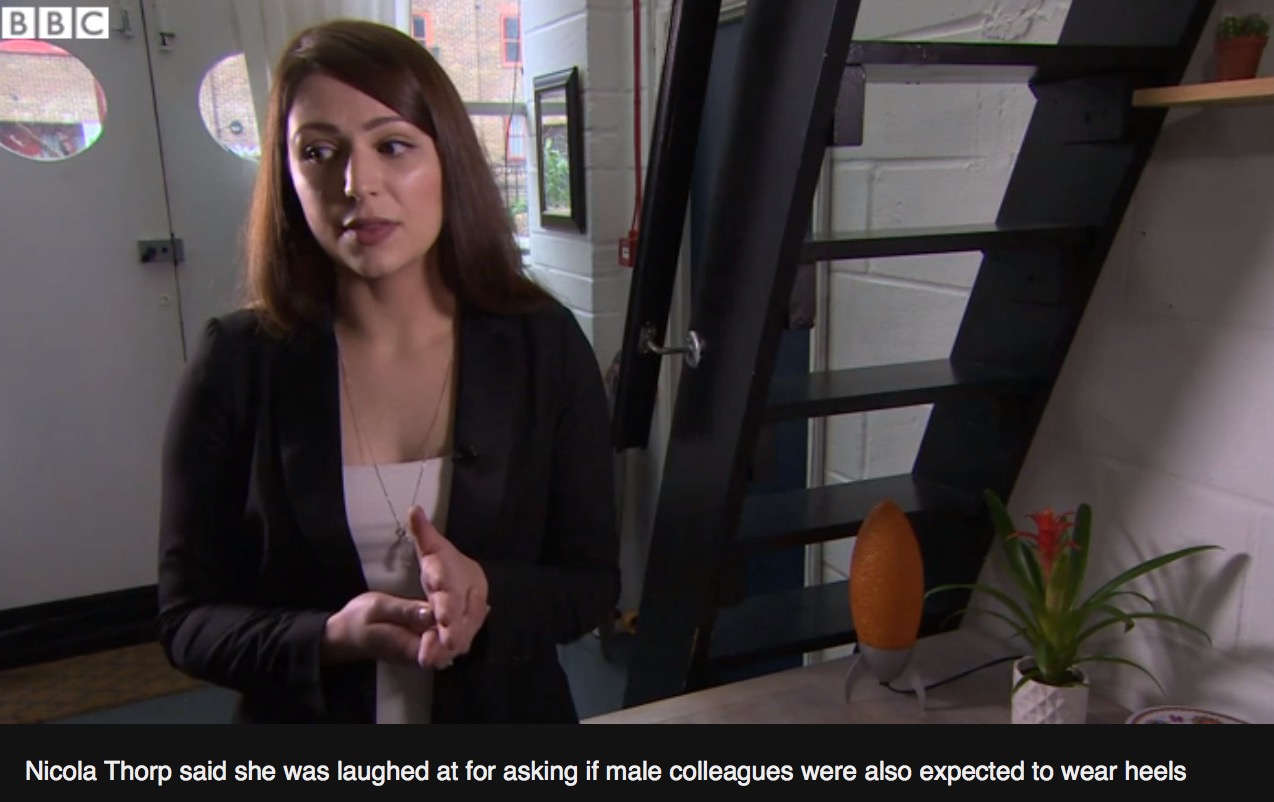
Londoner Nicola Thorp doesn’t want to wear high heels to work and apparently, a lot of other UK women don’t want to either. After Ms. Thorp’s new employer sent her home because she came to work in flat shoes, she started a petition, “asking the U.K. government to make it illegal for companies to require that women wear high heels to work.”
I got sent home from work for wearing flats. It's still legal for employers to require women to wear heels..pls sign https://t.co/2VxzAQhdoC
— Nicola Thorp (@MissNicolaSian) May 10, 2016
The petition has attracted over 120,000 signatures since it was posted two days ago. At 100,000 signers the issue became eligible to be debated in Parliament. And by the way, the temp agency Ms. Thorpe works for has already changed its policy.
In a BBC interview, Ms. Thorp points out that 20 years ago it was illegal for women to wear trousers to work and this changed because someone spoke up against that policy as well.
NowThis Media and Huffington Post put together a brilliant little video about the absurdity that is high heel wearing. Watch it – it’s fun and thought-provoking.
Hat tip to Ari Lopez Wei for the great find.

